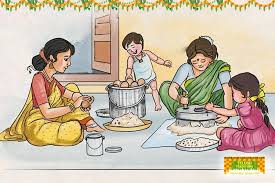It was a chilly evening in a small Telugu village. Ramakrishna, a proud father of three, sat on his verandah, reminiscing about the days when his children were young. His eyes softened as he remembered a particular evening when his eldest son, Chaitanya, softly touched his feet and expressed his love and respect. That simple gesture touched Ramakrishna’s heart deeply. In that quiet moment, Ramakrishna realized how vital it was to instill respect for family in his children, not just as a tradition but as a core value of Telugu culture. This story is a reflection of a deeply rooted tradition “premakante family ki viluva ichhevaaru”.
Understanding the Significance of Family Respect in Telugu Culture
Respect within the family, especially towards elders, holds a special place in Telugu traditions. It’s more than mere politeness; it’s a way of life that reflects love, humility, and gratitude. When we talk about “premakante family ki viluva ichhevaaru”, we’re referring to the heartfelt respect and reverence owed to family elders, which is considered essential for maintaining harmony and tradition.
The Roots of Respect in Telugu Traditions
Historical and Cultural Foundations
Telugu culture, with roots dating back thousands of years, has always emphasized the importance of familial bonds. Respect for elders is embedded in ancient scriptures and folklore. Stories of revered ancestors and wise elders serve as moral guidance for generations. Respect is shown through gestures like touching the feet of elders, a practice symbolizing humility and seeking blessings.
Religious Influence
Hindu rituals and festivals in Telugu tradition often highlight the significance of respecting family elders. During ceremonies, younger members seek blessings by touching the elders’ feet. This act is not just a ritual but an acknowledgment of the wisdom and life experience elders possess. Such practices reinforce the idea that respecting elders is an act of devotion and love.
How to Teach and Uphold Respect in Your Family
Lead by Example
Children often imitate their parents. Demonstrating respect in your actions and words sets a strong example. Greet elders politely, listen attentively, and show gratitude. Your behavior serves as a live lesson for your kids about how to respect family members and elders.
Create Meaningful Traditions
Incorporate traditions like touching elders’ feet during festivals or family gatherings. Encourage children to express their love and respect openly. Celebrating family achievements and sharing stories about ancestors can also foster a sense of respect and connection.
Instill Values through Communication
Talk about the importance of family respect regularly. Share stories from Telugu folklore that emphasize humility and reverence. When children understand the reasons behind these customs, they are more likely to value and practice them sincerely.
Modern Challenges and Ways to Maintain Respect
In today’s fast-paced world, some traditional practices might seem outdated or difficult to uphold consistently. Technology, busy schedules, and changing social norms can sometimes weaken family bonds and respect. But it is important to adapt without losing the core values. Here are some ways:
- Set aside quality family time regularly to bond and reinforce respect.
- Encourage open dialogues where children can express their feelings respectfully.
- Use modern platforms like video calls to stay connected with family members, especially elders living separately.
- Recognize and appreciate the efforts and sacrifices of elders openly, making them feel valued.
The Role of Respect in Strengthening Family Bonds
Respect acts as the glue that holds families together in Telugu culture. It fosters trust, understanding, and unconditional love. When family members honor each other’s feelings and contributions, it creates a nurturing environment where everyone feels valued. This mutual respect is also reflected in the way children develop their personal character and social relationships outside the family.
Conclusion
In essence, “premakante family ki viluva ichhevaaru” is more than just respecting elders—it’s about nurturing love, humility, and gratitude within the family. This tradition not only preserves Telugu cultural identity but also builds foundations for respectful, compassionate individuals. While modern life presents new challenges, the core principles of respecting family remain timeless. By leading with example, fostering communication, and adapting to contemporary contexts, families can continue to uphold this beautiful tradition. Remember, respect in the family compass points toward a harmonious and joyful life, just like the evening Ramakrishna cherished with his family. To learn more about the rich cultural heritage that influences such traditions, you can explore Wikipedia.






